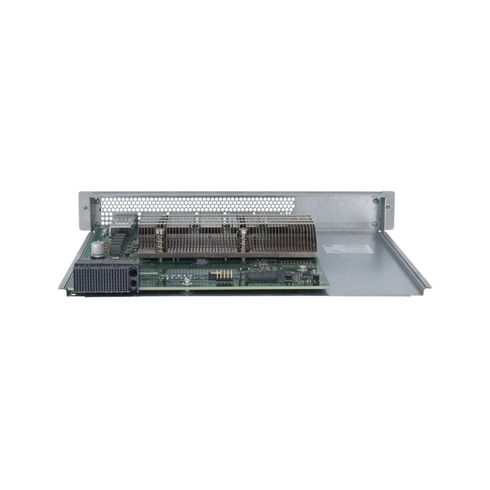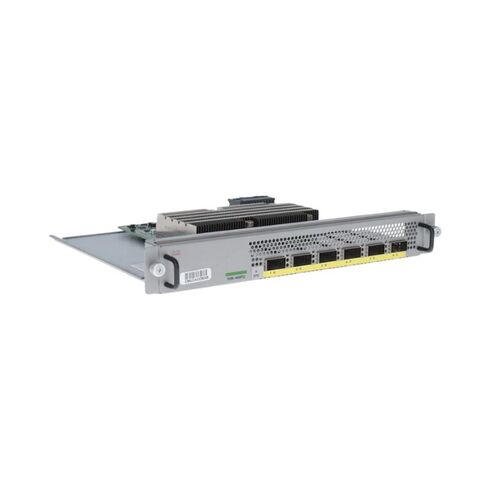N9K-M6PQ Cisco Nexus 9300 Series 6 Ports Uplink Module ACI Optical Fiber
- — Free Ground Shipping
- — Min. 6-month Replacement Warranty
- — Genuine/Authentic Products
- — Easy Return and Exchange
- — Different Payment Methods
- — Best Price
- — We Guarantee Price Matching
- — Tax-Exempt Facilities
- — 24/7 Live Chat, Phone Support
- — Visa, MasterCard, Discover, and Amex
- — JCB, Diners Club, UnionPay
- — PayPal, ACH/Bank Transfer (11% Off)
- — Apple Pay, Amazon Pay, Google Pay
- — Buy Now, Pay Later - Affirm, Afterpay
- — GOV/EDU/Institutions PO's Accepted
- — Invoices
- — Deliver Anywhere
- — Express Delivery in the USA and Worldwide
- — Ship to -APO -FPO
- — For USA - Free Ground Shipping
- — Worldwide - from $30
Same product also available in:
| SKU/MPN | Warranty | Price | Condition | You save |
|---|---|---|---|---|
| N9K-M6PQ | 1 Year Warranty | $153.00 | Excellent Refurbished | You save: $53.55 (26%) |
| N9K-M6PQ | 1 Year Warranty | $195.00 | Factory-Sealed New in Original Box (FSB) | You save: $68.25 (26%) |
Overview of Nexus 9300 Series Cisco N9K-M6PQ
- Brand: Cisco
- Part Number: N9K-M6PQ
Type of Product
- This product falls under the category of uplink modules, essential for robust network infrastructure.
Technical Specifications
- Designed for data networking
- Ideal for use in optical networks
Port and Interface Details
- Interfaces: 6 x 40GBase-X Network Uplink
Media and Performance Capabilities
- Media Type: Optical Fiber
Network Technology
- Ethernet Technology: 40 Gigabit Ethernet
- Network Technology: 40GBase-X
- Maximum Data Transfer Rate: Up to 40 Gbit/s
Series: Nexus 9300
The Cisco N9K-M6PQ Uplink Module belongs to the Nexus 9300 series, which is a family of fixed-port, high-density, and low-latency switches designed for data center applications. This series offers exceptional performance, scalability, and flexibility to meet the evolving needs of modern data centers.
Benefits of the Nexus 9300 Series
1. High Performance
The Nexus 9300 series switches are built to deliver high-performance networking capabilities. With advanced ASIC technology and a non-blocking architecture, these switches can handle the most demanding workloads with ease. They offer high throughput and low latency, ensuring smooth and efficient data transmission.
2. Scalability
Scalability is a critical factor in data center environments where the network needs to grow alongside the business. The Nexus 9300 series switches support modular expansion, allowing users to easily add more ports or upgrade their network capacity as their needs evolve. This flexibility ensures that organizations can scale their infrastructure without disruptions or costly replacements.
3. Flexibility
The Nexus 9300 series switches provide a wide range of connectivity options to accommodate various network requirements. They offer support for Ethernet, Fibre Channel over Ethernet (FCoE), and Virtual Extensible LAN (VXLAN), enabling seamless integration with existing infrastructure and facilitating the adoption of new technologies.
4. Enhanced Security
Security is a top priority for any data center. The Nexus 9300 series switches come equipped with comprehensive security features to protect sensitive data and prevent unauthorized access. These switches support advanced security protocols such as Secure Shell (SSH), Secure Sockets Layer (SSL), and MACsec encryption, ensuring data confidentiality and integrity.
Importance of the Nexus 9300 Series
The Nexus 9300 series is essential for organizations that require a reliable and high-performance network infrastructure. Whether it's for large-scale data centers, cloud computing environments, or mission-critical applications, these switches offer the necessary capabilities to support demanding workloads and ensure optimal performance.
By choosing the Nexus 9300 series, users can take advantage of its advanced features and future-proof their network infrastructure. The scalability and flexibility of these switches allow organizations to adapt to changing business needs without major disruptions or costly investments.
Ports: 6
The Cisco N9K-M6PQ Uplink Module comes equipped with 6 ports, providing users with a versatile connectivity solution. The availability of multiple ports is crucial for data centers that require efficient communication between various devices and systems.
Benefits of Multiple Ports
1. Increased Bandwidth
Having multiple ports allows for increased bandwidth capacity, enabling data centers to handle large volumes of traffic without congestion. With 6 ports, the N9K-M6PQ module offers enhanced throughput, ensuring smooth and efficient data transmission between connected devices.
2. Redundancy and High Availability
Redundancy is a critical aspect of any network infrastructure. By having multiple ports, organizations can create redundant connections, ensuring that if one port fails or experiences issues, the traffic can be automatically routed through another available port. This redundancy minimizes downtime and enhances network reliability.
3. Flexibility in Network Design
The availability of multiple ports allows for greater flexibility in network design and topology. Data centers can create different network segments or connect to various devices or systems simultaneously. This flexibility enables organizations to optimize their network architecture based on their specific requirements and improve overall performance.
Importance of Multiple Ports
The presence of 6 ports in the N9K-M6PQ Uplink Module offers significant advantages for users. It ensures efficient data transfer, reduces the risk of network downtime, and provides the flexibility required for complex network designs. With multiple ports, organizations can build resilient and high-performance networks that support their critical business operations.
Power Source: ACI
The Cisco N9K-M6PQ Uplink Module is powered by ACI (Application Centric Infrastructure), which is a holistic architecture that simplifies and automates network management. ACI provides a unified approach to data center networking, combining physical and virtual resources into a single policy-driven framework.
Benefits of ACI
1. Simplified Network Operations
ACI simplifies network operations by abstracting the underlying complexity of the infrastructure. It enables administrators to define policies that dictate how the network should behave, rather than manually configuring individual devices. This policy-driven approach reduces the risk of human errors, streamlines deployment, and simplifies ongoing management tasks.
2. Automation and Orchestration
ACI automates network provisioning and configuration, making it easier to deploy new services or scale existing ones. By leveraging programmable interfaces and centralized management, ACI enables organizations to achieve faster time-to-market and improve overall operational efficiency. It also facilitates seamless integration with orchestration tools and cloud platforms, enabling a more agile and dynamic data center environment.
3. Enhanced Visibility and Troubleshooting
ACI provides comprehensive visibility into network traffic and application performance. It captures detailed telemetry data, allowing administrators to monitor and analyze network behavior in real-time. This visibility simplifies troubleshooting processes, accelerates fault isolation, and improves overall network reliability.
Importance of ACI
ACI is a crucial feature for users of the N9K-M6PQ Uplink Module as it brings numerous benefits to data center operations. By adopting ACI, organizations can simplify network management, reduce operational costs, and accelerate service delivery. The automation and orchestration capabilities of ACI enable organizations to achieve greater agility and responsiveness, ensuring their network infrastructure can keep up with evolving business demands.
Connection Type: Optical Fiber
The Cisco N9K-M6PQ Uplink Module supports the use of optical fiber connections, providing users with a reliable and high-speed connectivity option. Optical fiber offers several advantages over traditional copper-based connections and is widely used in data center environments.
Benefits of Optical Fiber Connections
1. High Bandwidth Capacity
Optical fiber connections offer significantly higher bandwidth capacity compared to copper-based connections. This increased capacity allows for the seamless transmission of large volumes of data, making it ideal for data centers that handle massive amounts of traffic and require fast and reliable communication between devices.
2. Longer Transmission Distances
Optical fiber connections can transmit data over longer distances without experiencing signal degradation or loss. This extended reach is critical for data centers that span multiple floors or buildings. With optical fiber connections, organizations can ensure consistent and reliable communication between different parts of their infrastructure.
3. Immunity to Electromagnetic Interference
Unlike copper cables, optical fiber is immune to electromagnetic interference (EMI), which can degrade the quality of signals. EMI can be caused by nearby electrical devices or power cables, but optical fiber connections are not affected by these external factors. This immunity ensures a stable and reliable network connection, even in environments with high levels of electrical noise.
Importance of Optical Fiber Connections
The availability of optical fiber connections in the N9K-M6PQ Uplink Module is essential for users who require high-speed and reliable connectivity. Optical fiber allows for efficient data transmission over long distances, ensures a stable network connection, and provides the necessary bandwidth capacity to support demanding data center applications. By leveraging optical fiber connections, organizations can build robust and future-proof network infrastructures.











